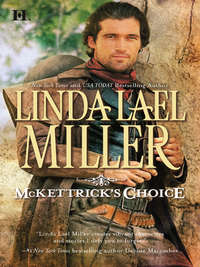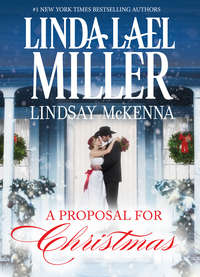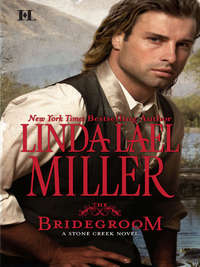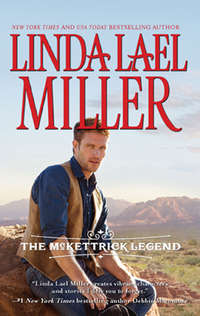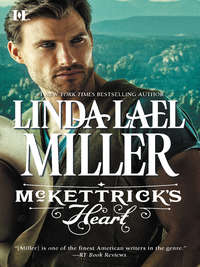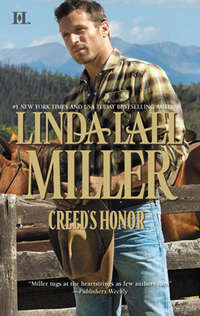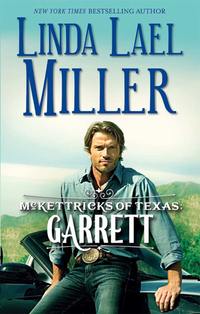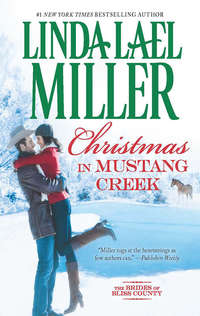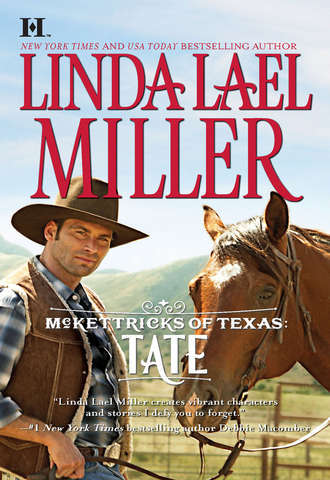
Полная версия
McKettricks of Texas: Tate
Cheryl flushed, toyed with one tasteful gold earring. “Bastard,” she whispered, peevish. “Why do you have to be so damn pigheaded about things like this?”
He laughed. Hooked his thumbs through the belt loops of his jeans. Dug in his heels a little—both literally and figuratively. “If other people want to let their kids play Miss This-That-and-the-Other-Thing, that’s their business. It’s probably harmless fun, but mine aren’t going to—not before they’re old enough to make the choice on their own, anyhow. By that time, I hope Audrey and Ava will have more in their heads than makeup tips and the cosmetic uses of duct tape.”
Eyes flashing, Cheryl looked as though she wanted to put out both hands and shove him backward into the koi pond—or jerk the clipboard from under his arm and bash him over the head with it. She did neither of those things—she didn’t want a scene any more than he did, though her reasons were different. Tate cared about one thing and one thing only: that his daughters had a good time at their birthday party. Cheryl, on the other hand, knew a public dustup would make the rounds of the country club and the Junior League before sundown.
She had her image to consider.
Tate, by contrast, didn’t give a rat’s ass what anybody thought—except for his daughters, that is, and a few close friends.
So they glared at each other, he and this woman he’d married years ago, squaring off like two gunfighters on a dusty street. And then Ava slipped between them.
“Don’t fight, okay?” she pleaded anxiously, the hot Texas sunlight glinting on the smudged lenses of her glasses. “It’s our birthday, remember?”
Tate felt his neck pulse with the singular heat of shame. So much for keeping the ongoing hostilities between Mommy and Daddy under wraps.
Cheryl smiled wickedly and rested a manicured hand on Ava’s shoulder, left all but bare by the spaghetti strap holding up her dress—a miniature version of her mother’s outfit. Audrey’s getup was the same, except blue.
“Your daddy,” Cheryl told the child sweetly, “doesn’t want you and Audrey to compete in the Pixie Pageant. I was trying to change his mind.”
Good luck with that, Tate thought, forcibly relaxing the muscles in his jaws. He tried for a smile, for Ava’s sake, but the effort was a bust.
“That stuff is dumb anyway,” Ava said.
Audrey appeared on the scene, as though magnetized by an opinion at variance with her own. “No, it isn’t,” she protested, with her customary spirit. “Pageants are good for building self-confidence and making friends, and if you win, you get a banner and a trophy and a tiara.”
“I see you’ve been coaching them to take the party line,” Tate told Cheryl.
Cheryl’s smile was dazzling. He’d spent a fortune on those pearly whites of hers. Through them, she said, “Shut up, Tate.”
Ava, always sensitive to the changing moods of the parental units, started to cry, making a soft, sniffly sound that tore at Tate’s heart. “We’re only going to be six once,” she said. “And everybody’s looking!”
“Thank heaven we’re only going to be six once,” Audrey interjected sagely, folding her arms Cheryl-style. “I’d rather be forty.”
Tate bent his knees, scooped up Ava in the crook of one arm and tugged lightly at Audrey’s long braid with his free hand. Ava buried her face in his shoulder, bumping her glasses askew. He felt tears and mucus moisten the fabric of his pale blue shirt.
“Forty?” she said, voice muffled. “Even Daddy isn’t that old!”
“You’re such a baby,” Audrey replied.
“Enough,” Tate told both children, but he was looking at Cheryl as he spoke. “When is this shindig supposed to be over?”
They’d opened presents, devoured everything but the cakes and competed for prizes a person would expect to see on a TV game show. What else was there to do?
“Why can’t you just stop fighting?” Ava blurted.
“We’re not fighting, darling,” Cheryl pointed out quietly, before turning to sweep her watchful friends and the nannies up in a benign smile. “And stop carrying on, Ava. It isn’t becoming—or ladylike.”
“Can we go out to the ranch, Daddy?” Ava asked him plaintively, ignoring her mother’s comment. “I like it better there, because nobody fights.”
“Me, too,” Tate agreed. It was his turn to take the kids, and he’d been looking forward to it since their last visit. Giving them back was always a wrench.
“Nobody fights at the ranch?” Audrey argued, sounding way too bored and way too sophisticated for a six-year-old. Yeah, she was a prime candidate for the Pixie Pageant, all right, Tate thought bitterly—bring on the mascara and enough hairspray to rip a new hole in the ozone layer, and don’t forget the feather boas and the fishnet stockings.
Audrey drew a breath and went right on talking. “I guess you don’t remember the day Uncle Austin came home from the hospital after that bull hurt him so bad, before he started rehab in Dallas, and how he told Daddy and Uncle Garrett to stay out of his part of the house unless they wanted a belly full of buckshot.”
Cheryl arched one eyebrow, triumphant. For all their land, cattle, oil shares and cold, hard cash, the McKettricks were just a bunch of Texas rednecks, as far as she was concerned. She’d grown up in a Park Avenue high-rise, a cherished only child, after all, her mother an heiress to a legendary but rapidly dwindling fortune, her father a famous novelist, of the literary variety.
But, please, nobody mention that dear old Mom snorted coke and would sleep with anything in pants, and Dad ran through the last of his wife’s money and then his surprisingly modest earnings as the new Ernest Hemingway.
Cheryl had never gotten over the humiliation of having to wait tables and take out student loans to put herself through college and law school.
“I wonder what my attorney would say,” Cheryl intoned, “if I told him the children are exposed to guns, out there on the wild and wooly Silver Spur.”
While Tate couldn’t argue that there weren’t firearms on the ranch—between the snakes and all the other dangers inherent to the land, firepower might well prove to be a necessity at any time—it was a stretch to say the girls were “exposed” to them. Every weapon was locked up in one of several safes, and the combinations changed regularly.
“I wonder what mine would say,” Tate retorted evenly, the fake smile aching on his face, “if he knew about your plans for this week.”
“Stop,” Ava begged.
Tate sighed, kissed his daughter smartly on the forehead, and set her on her feet again. “Sorry, sweetheart,” he said. “Say goodbye and thanks to your friends. The party’s over.”
“They haven’t even sung the song I taught them,” Cheryl said.
Ava leaned against Tate’s hip. “We’re not good singers at all,” she confided.
Somewhat to Tate’s surprise, it was Audrey, the performer in the family, who turned on one sandaled heel, faced the assemblage and announced cheerfully, “You can all go home now—my dad says the party’s over.”
Cheryl winced.
The kids—and the pony—seemed relieved. So did the nannies, though the proper term, according to Cheryl, was au pairs. The mothers, many of whom Tate had known since kindergarten and dated in high school between all-too-frequent breakups with Libby Remington, the great love of his youth, if not his entire life, hid bitchy little smiles with varying degrees of success.
“The girls are a little tired,” Cheryl explained, with convincing sincerity. “All this excitement—”
“Can we ride horses when we get to the ranch?” Audrey called, from halfway across the yard. “Can we swim in the pool?”
Tate made damn sure he didn’t smile at this indication of how “tired” his daughters were, but it was hard.
Ava remained at his side, both arms clenched around his waist now.
“Their suitcases,” Cheryl said tightly, “are in the hall.”
“Let’s load Bamboozle in the trailer,” Tate told Ava, gently easing out of her embrace. “Then we’ll get your stuff and head for the ranch.”
Ava peeled herself away from Tate, walked over and took Bamboozle by the bridle strap, patiently waiting to lead the elderly animal to the trailer hitched to the back of Tate’s truck. Audrey had disappeared into the house, on some mission all her own.
“Don’t help,” Cheryl snapped, out of one side of her mouth. “You’ve already done enough, Tate McKettrick.”
“I live to delight you in every possible way, Cheryl.”
Audrey poked her head out between the French doors standing a little ajar between the living room and the patio. “Can we stop at the Perk Up on the way out of town, Dad?” she wanted to know, as calmly as if the backyard weren’t full of dismissed guests. “Get some of those orange smoothie things, like before?”
Tate grinned. “Sure,” he told his daughter, even though the thought of stopping at Libby’s coffee shop made the pit of his stomach tighten. He’d only gone in there the last time because he’d known Libby was out of town, and her sister, Julie, was running the show.
Which was ridiculous. They’d managed to avoid each other for years now, no mean trick in such a small town, but it was getting to be too damn much work.
“Just what they need—more sugar,” Cheryl muttered, shaking her head as she walked away, her arms still crossed in front of her chest, only more tightly now.
Tate held his tongue. He hadn’t been the one to serve cake and ice cream and fruit punch by the wheelbarrow load all afternoon.
Cheryl kept walking.
Tate and Ava led the pony into the horse trailer, which, along with his truck, took up at least three parking spaces on the shady street in front of Cheryl’s house. He’d bought the place for her as a part—a small part—of their divorce settlement.
“Boozle might get lonely riding in this big trailer all by himself,” Ava fretted, standing beside the pony while he slurped up water from a bucket. “Maybe I should ride back here with him, so he’d have some company.”
“Not a chance,” Tate said affably, dumping a flake of hay into the feeder for the pony to munch on, going home. “Too dangerous.”
Ava adjusted her glasses. “Audrey really wants to be in that Pixie Pageant,” she said, her voice small. “She’s going to nag you three ways from Sunday about it, too.”
Tate bit back a grin. “I think I can handle a little nagging,” he said lightly. “Let’s go get your stuff and hit the road, Shortstop.”
“I probably wouldn’t win anyway,” Ava mused wistfully, stopping her father cold.
“Win what?” Tate asked.
Ava giggled, but it was a strained sound, like she was forcing it. “The Pixie Pageant, Dad. Keep up, will you?”
Tate’s throat went tight, but he managed a chuckle. “Sure, you’d win,” he said. “And that’s another reason I won’t let you enter in the first place. Just think how bad all those other little girls would feel.”
“Audrey could be Miss Pixie,” Ava speculated thoughtfully, a small, light-rimmed shadow standing there in the horse trailer. “She can twirl a baton and everything. I keep on dropping mine.”
“Audrey isn’t entering,” Tate said. Bamboozle was between them; he removed the pony’s saddle and blanket, ran a hand along his sweaty back. “She’ll just have to content herself with being Miss McKettrick, at least for the foreseeable future.”
Ava mulled that over for a few moments, chewing her lower lip. “Do you think I’ll be pretty when I grow up, Dad?”
Tate moved to the back of the trailer, jumped down, turned and held out his arms for Ava, even though she could have walked down the ramp. “No,” he said, as she came within reach. “I think you’ll be beautiful, like you are right now.”
Ava felt featherlight as he swung her to the ground, and it gave him a pang. Was it his fault that the girls had been born too soon? Was there something he could have done to prevent all the struggles they’d faced just getting through infancy?
“You’re only saying that because you’re my dad.”
“I’m saying it because it’s true,” Tate said.
Ava stepped back while he slid the ramp into place under the trailer, then shut and latched the doors. “Mommy says it’s never too soon to think about becoming a woman,” she ventured. “Things we do now could affect our whole, entire lives, you know.”
Tate kept his back to the child, so she wouldn’t see the fury in his face. He spoke in the most normal tone he could summon. “You’ll only be a little girl for a few years,” he answered carefully. “Just concentrate on that for now, okay? Because ‘becoming a woman’ will take care of itself.”
Wasn’t it only yesterday that the twins were newborns, making a peeping sound instead of squalling, like most babies, hooked up to tubes and wires, dwarfed by their incubators at the hospital in Houston? Now, suddenly, they were six. He’d be walking them down the aisle at their weddings before he knew what hit him, he thought bleakly.
He shoved one hand through his hair, longing to get back to the ranch and pull on battered jeans that had never known the heat of an iron. Shed the spiffy shirt, so fresh from the box that the starch in the fabric chafed his skin.
On the ranch, he could breathe, although he’d seriously considered moving out of the mansion, taking up residence in the old bunkhouse or a simple single-wide down by one of the bends in the creek.
Mothers and nannies streamed past, herding grouchy children toward various cars and minivans. A few of the women spoke to Tate, most of them cordial, while a few others wished Ava a happy birthday in subdued tones and ignored him completely.
Tate wasn’t much for chatting, but he was friendly enough. When somebody spoke to him, he spoke back.
A scraping sound alerted him to Audrey, dragging her suitcase down the front walk on its wheels. He went to take the bag from her, stowed it in the front seat, on the passenger side, where his dog, Crockett, used to ride. Crockett had died of old age more than a year before, but Tate still forgot he wasn’t around sometimes and stood with the truck door open, waiting to hoist his sidekick aboard.
“You got your bag packed?” he asked Ava, when she scrambled into the back seat, with Audrey. They both had those special safety rigs, booster chairs with straps and hooks.
“I’ve got plenty of clothes at the ranch,” Ava responded, with a shake of her head. One of the pink barrettes holding her bangs out of her face had sprung loose, and her braid was coming undone. “Let’s go before Mom makes us come back and sing.”
Tate laughed, rounded the front of the truck and got behind the wheel.
“Beauty-Shop Betsey,” Audrey scoffed. “What possessed Jeffrey’s mom to buy us doll heads with curlers?” She’d been talking like a grown-up since she was two.
“Hey,” Tate said, starting up the engine, waiting for the flock of departing vans and Volvos to thin out a little. God only knew when Blue River, official population 8,472, had last seen a traffic snarl like this. “If somebody goes to all the trouble of buying you a birthday present, you ought to appreciate it.”
“Mom said we could exchange the stuff we don’t want,” Audrey informed him, with a touch of so-there in her tone. “Everybody included gift receipts.”
Tate figured it was high time to change the subject. “How about those orange smoothies?” he asked.
TATE MCKETTRICK, LIBBY REMINGTON thought, watching as he drew his truck and horse trailer to a stop in front of her shop, got out and strode purposefully toward the door.
It bothered her that after all this time the sight of him still made her heart flutter and her stomach jump. Damn the man, with his dark, longish hair, ink-blue eyes, and that confident, rolling way he moved, as though he’d greased his hip sockets.
Although it was growing, with a population now of almost 9,000, Blue River wasn’t exactly a metropolis, and that meant she and Tate ran into each other from time to time. Whenever they did, they’d nod and quickly head in separate directions, but they’d never sought each other out.
Poised to turn the “Open” sign to “Closed,” Libby closed her eyes for a moment, hoping he was a mirage. A figment of her fevered imagination.
He wasn’t, of course.
When she looked again, he was standing just on the other side of the glass door, peering through the loop in the P in Perk Up, grinning.
A McKettrick—a pedigree in that part of the country—Tate was used to getting what he wanted, including service on a Sunday afternoon, when the store closed early.
Libby sighed, turned the dead bolt, and opened the door.
“Two orange smoothies,” he said, without preamble. “To go.”
Libby looked past him, saw his twin daughters in the back seat of his fancy truck. An old grief rose up within her, one she’d worked hard to lay to rest. From the time she’d fallen for Tate, back in second grade, she’d planned on marrying him when they both grew up, been bone-certain she’d be the one to have his babies.
“Where’s Crockett?” she asked, without intending to.
Sadness moved in Tate’s impossibly blue eyes. “Had to have him put down a while back,” he said. “He was pretty old, and then he got sick.”
“I’m sorry,” Libby said, because she was. For the dog.
“Thanks,” he answered.
She stepped back to let Tate in, against her better judgment. “I’m fostering a couple of mixed breeds, because the shelter is full again. Want one—or, better yet, both?”
Tate shook his head. Light caught in his ebony hair, where the comb ridges still showed. “Just a couple of those smoothie things. Orange. Light on the sugar, if that’s an option.”
Libby stepped behind the counter, more because she wanted to put some kind of solid barrier between herself and Tate than to mix the drinks he’d requested. Her gaze strayed to the kids waiting in the truck again. They both looked like their father. “Will there be anything else?”
“No,” Tate said, taking out his beat-up wallet. “How much?”
Libby told him the price of two orange smoothies, with tax, and he laid the money on the countertop. There were at least three drive-through restaurants on the outskirts of town; he’d pass them coming and going from the Silver Spur. So why had he stopped at her store, on Blue River’s narrow main street, with a horse trailer hitched to his huge phallic symbol of a truck?
“You’re sure you don’t want something for yourself?” she asked lightly, and then wished she’d kept her mouth shut.
Tate’s grin tilted to one side. He smelled of sun-dried laundry and aftershave and pure man. A look of mischief danced in his eyes.
When he spoke, though, he said, “It’s their birthday,” accompanied by a rise and fall of his powerful shoulders. His blue shirt was open at the throat, and she could see too much—and not quite enough—of his chest.
Libby whipped up the drinks, filling two biodegradable cups from a pitcher, attached the lids and set them next to the cash register. “Then maybe you’d like to give them a dog or two,” she replied, with an ease she didn’t feel. Being in such close proximity to Tate rattled her, but it probably didn’t show. “Since it’s their birthday.”
“Their mother would have a fit,” he said, reaching for the cups. His hands were strong, calloused from range work. Despite all that McKettrick money, he wasn’t afraid to wade into a mudhole to free a stuck cow, set fence posts in the ground, buck bales or shovel out stalls.
It was one of the reasons the locals liked him so much, made them willing to overlook the oil wells, now capped, and the ridiculously big house and nearly a hundred thousand acres of prime grassland, complete with springs and creeks and even a small river.
He was one of them.
Of course, the locals hadn’t been dumped because he’d gotten some other woman pregnant just a few months after he’d started law school.
No, that had happened to her.
She realized he was waiting for her to respond to his comment about his ex-wife. Their mother would have a fit.
Can’t have that, Libby thought, tightening her lips.
“The ice is melting in those smoothies,” she finally said. Translation: Get out. It hurts to look at you. It hurts to remember how things were between us before you hooked up with somebody you didn’t even love.
Tate grinned again, though his eyes looked sad, and then he turned sideways, ready to leave. “Maybe we’ll stop by your place and have a look at those dogs after all,” he said. “Would tomorrow be good?”
He’d stayed with Cheryl-the-lawyer for less than a year after the twins were born. As soon as the babies began to thrive, he’d moved Cheryl and his infant daughters into the two-story colonial on Oak Street.
The gossip had burned like a brush fire for months.
“That would be fine,” Libby said, back from her mental wanderings. Tate McKettrick might have broken her heart, but he’d loved his ancient, arthritic dog, Davy Crockett. And she needed to find homes for the pair of pups.
Hildie, her adopted black Lab, normally the soul of charity, was starting to resent the canine roommates, growling at them when they got too near her food dish, baring her teeth when they tried to join her on the special fluffy rug at the foot of Libby’s bed at night. The newcomers, neither more than a year old, seemed baffled by this reception, wagging their tails uncertainly whenever they ran afoul of Hildie, then launching right back into trouble.
They would be very happy out there on the Silver Spur, with all that room to run, Libby thought.
A rush of hope made the backs of her eyes burn as she watched Tate move toward the door.
“Six?” she said.
Tate, shifting the cups around so he could open the door, looked back at her curiously, as though he’d already forgotten the conversation about the dogs, if not Libby herself.
“I close at six,” Libby said, fanning herself with a plastic-coated price list even though the secondhand swamp cooler in the back was working fine, for once. She didn’t want him thinking the heat in her face had anything to do with him, even though it did. “The shop,” she clarified. “I close the shop at six tomorrow. You could stop by the house and see the dogs then.”
Tate looked regretful for a moment, as though he’d already changed his mind about meeting the potential adoptees. But then he smiled in that way that made her blink. “Okay,” he said. “See you a little after six tomorrow night, then.”
Libby swallowed hard and then nodded.
He left.
She hurried to lock the door again, turned the “Closed” sign to the street, and stood there, watching Tate stride toward his truck, so broad-shouldered and strong and confident.
What was it like, Libby wondered, to live as though you owned the whole world?
On the off chance that Tate might glance in her direction again, once he’d finished handing the cups through the window of his truck to the girls, Libby quickly turned away.
She took the day’s profits from the till—such as they were—and tucked the bills and checks into a bank deposit bag. She’d hide them in the usual place at home, and stop by First Cattleman’s in the morning, during one of the increasingly long lulls in business.
The house she’d lived in all her life was just across the alley, and Hildie and the pups were in the backyard when she approached the gate, Hildie lying in the shade of the only tree on the property, the foster dogs playing tug-of-war with Libby’s favorite blouse, which had either fallen or been pulled from the clothesline.
Seeing her, the pups dropped the blouse in the grass—the lawn was in need of mowing, as usual—and yipped in gleefully innocent greeting. Libby didn’t have the heart to scold them, and they wouldn’t have understood anyway.
With a sigh, she retrieved the blouse from the ground and stayed bent long enough to acknowledge each of the happy-eyed renegades with a pat on the head. “You,” she said sweetly, “are very, very bad dogs.”
They were ecstatic at the news. A matched set, they both had golden coats and floppy ears and big feet. While Hildie looked on, nonplussed, they barked with joy and took a frenzied run around the yard, knocking over the recycling bin in the process.


